Page 8 of 9
Re: Nova in Cassiopea (nova Cas 2020)
Posted: Sun Sep 13, 2020 10:26 am
by Vincent Lecocq
hello,
new spectrum of nova Cas 2020; recorder this night (12-13/09):
clear skies,
vincent
Re: Nova in Cassiopea (nova Cas 2020)
Posted: Sun Sep 13, 2020 9:40 pm
by Christian Buil
C''est très surprenant Vincent, on a fait en gros le même spectre avec le même télescope (je suppose que c'est un Newton Kepler 250 f/4.5), le même temps de de pose et au même moment :
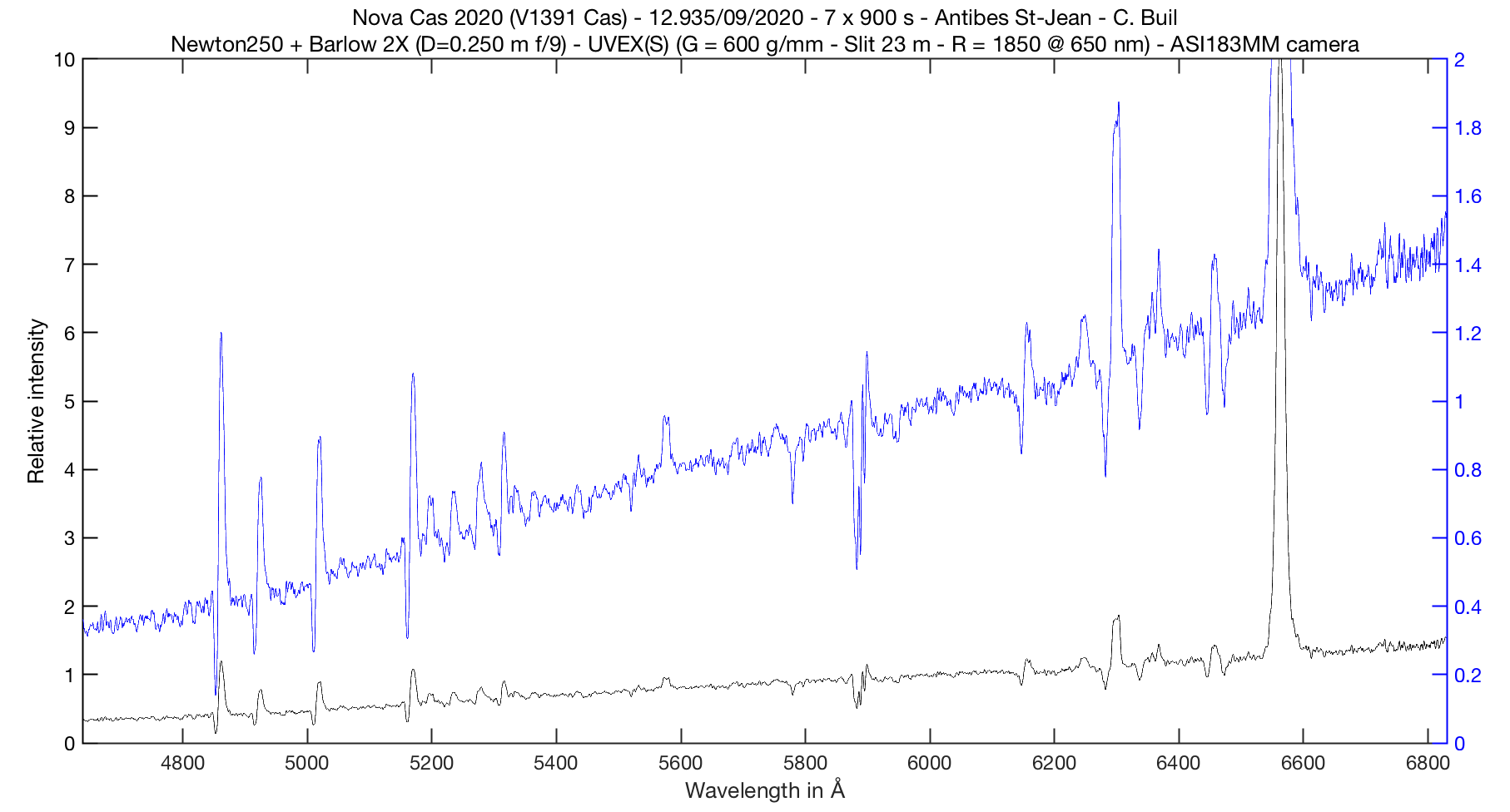
Ce qui change cependant c'est le spectrographe et la caméra. Dans mon cas UVEX, qui accepte des capteurs relativement larges et donc une couverture spectrale assez identique à la tienne, mais avec un réseau de 600 t/mm qui donne une résolution spectrale supérieure.
En revanche, en contre-partie, le RSB est supérieur chez toi.
Très intéressante comparaison.
Christian
P Cygni profiles changing
Posted: Mon Sep 14, 2020 12:42 pm
by John Coffin
It’s interesting to try and relate the spectra to the light curves. This is a fascinating object.
Here is the latest AAVSO light curve
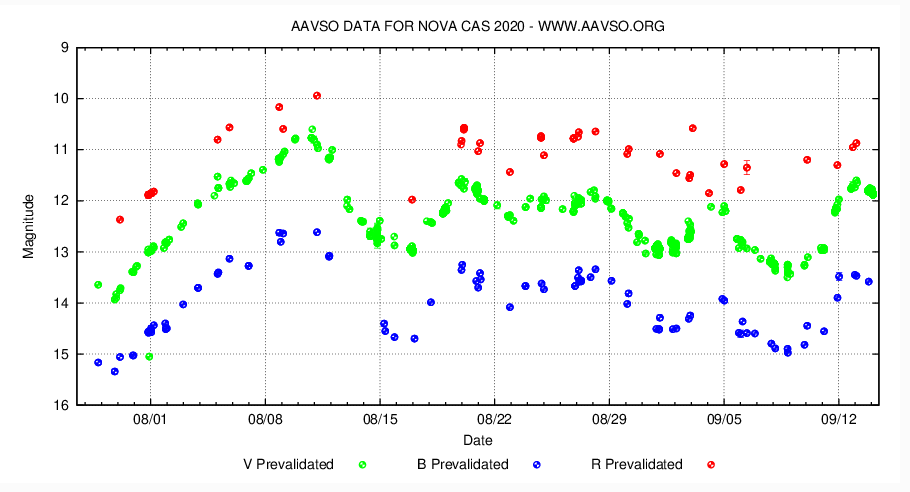
- aavso light curve nova cas 2020.png (46.41 KiB) Viewed 5790 times
Last night’s spectrum compared with the 5th September

- nova cas 5 sept v 13 sept.png (58.6 KiB) Viewed 5790 times
Can anyone explain why there isn’t an absorption line associated with the H alpha emission line?
Re: Nova in Cassiopea (nova Cas 2020)
Posted: Mon Sep 14, 2020 8:19 pm
by Francois Teyssier
It’s interesting to try and relate the spectra to the light curves.
Yes, during the re-brightening, the spectrum recovers -more or less- the previous aspect, with notably P Cygni profiles in numerous lines (Balmer, Fe II (42) ...)
The spectral changes, with practically no exception, follow what may be
called “Stratton’s rule.” This was stated by its originator as follows: “The spectrum
varies with the magnitude. As a rough generalization it may be said that a maximum
corresponds to a spectrum which is normal at an earlier stage of the star’s history”
(Stratton 1920, p. 65). in McLaughlin (1955): The Spectrum of the Slow Nova V 356 Aquilae (1936)
why there isn’t an absorption line associated with the H alpha emission line?
In fact, there's an absorption in H alpha, with about the same (at a first order) than in other Balmer lines.
But the intensity of the emission in H alpha is much greater (see "Balmer decrement"), thus the absorption is "diluted" in the emission and will produce only a change of slope in the blue part of the emission line.
This is the reason why H beta (for example) produces -generally- much more information about the physics of the object than H alpha.
i.e. for observers using a Lhires III with gratings 600 to 2400 l/mm, the H beta range (for example) is much more interesting than H alpha range
Have a look on Peter's monitoring of the nova in the database.
All the best,
François
Re: Nova in Cassiopea (nova Cas 2020)
Posted: Tue Sep 15, 2020 10:44 am
by Christian Buil
A near infrared spectrum (I use here UVEX 600 l/mm grating blazed at 750 nm and a 35 microns slit on a T250 + Barlow, see explanation here:
http://www.spectro-aras.com/forum/viewt ... f=8&t=2624 )
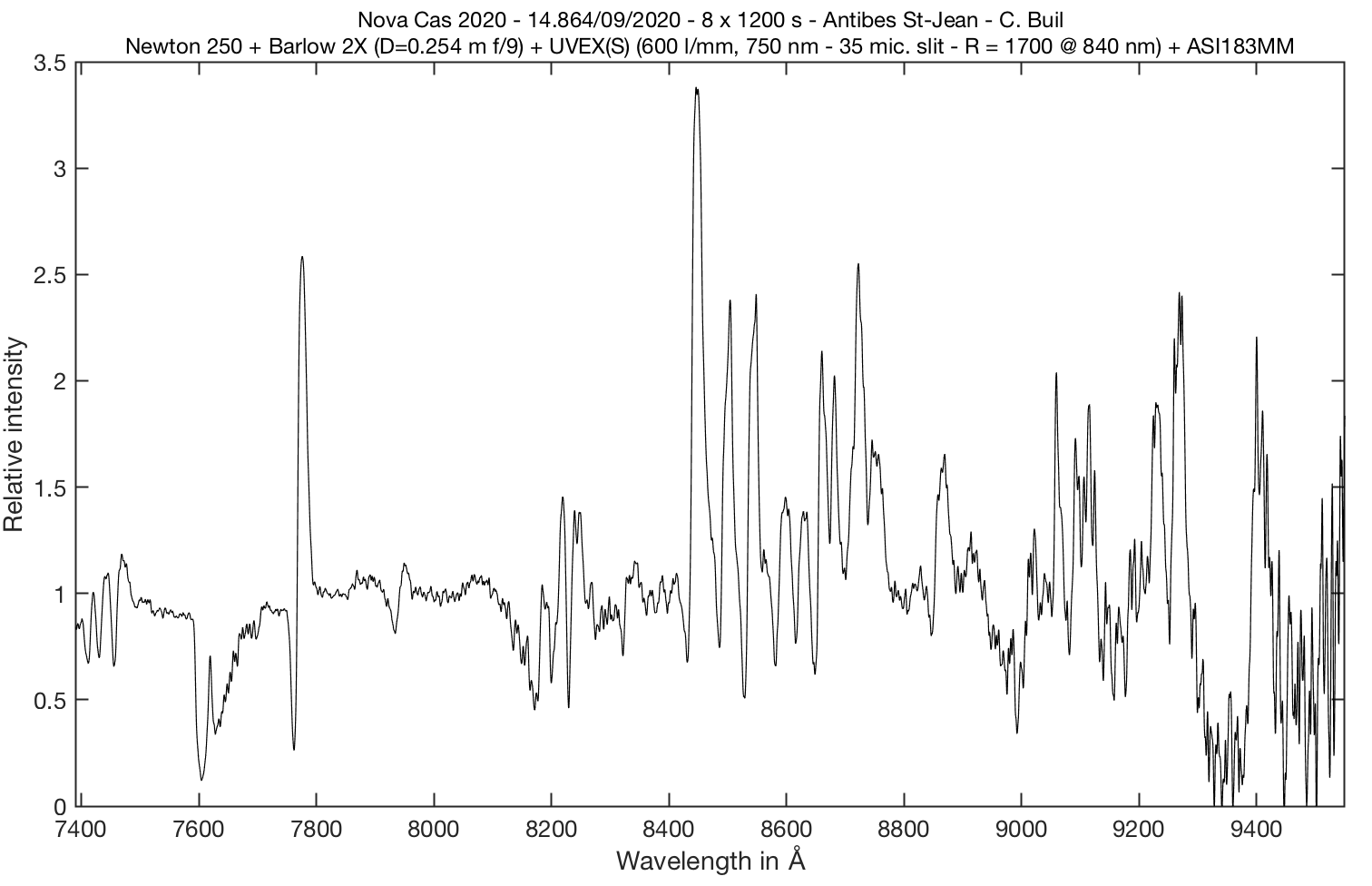
For the curiosity, comparison and calibration of nova spectrum, some Cassopiea constellation star IR spectra:
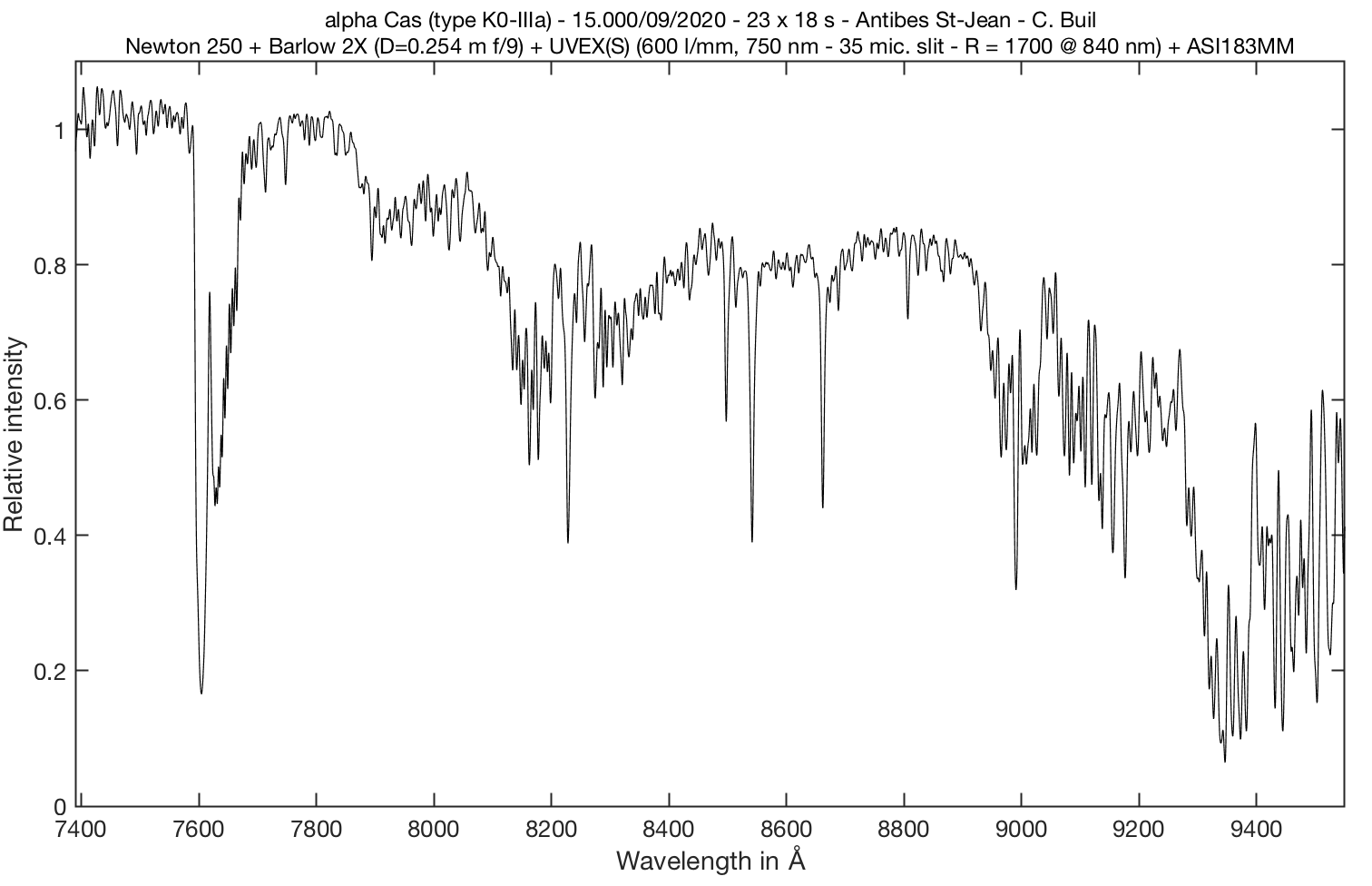
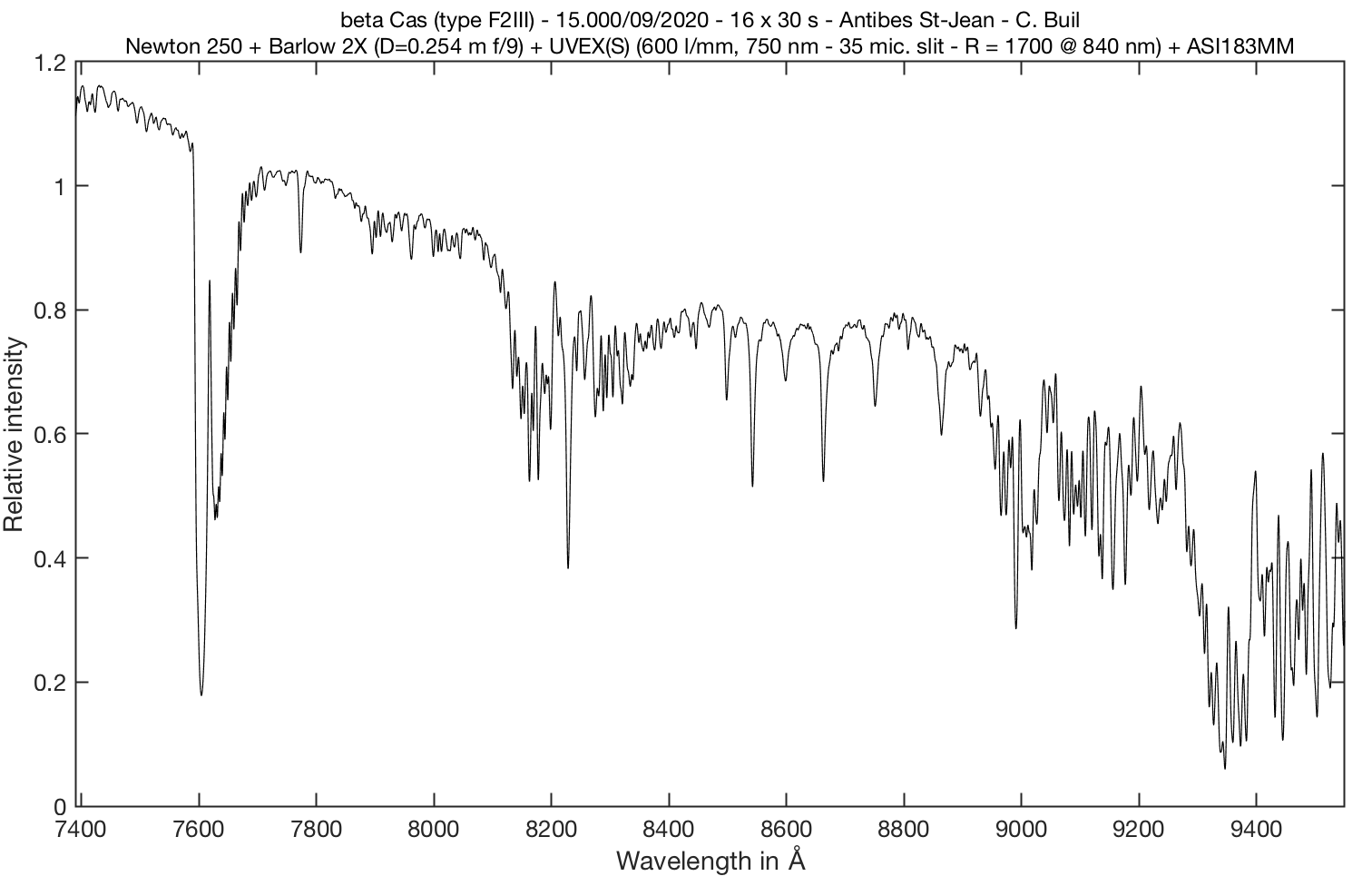
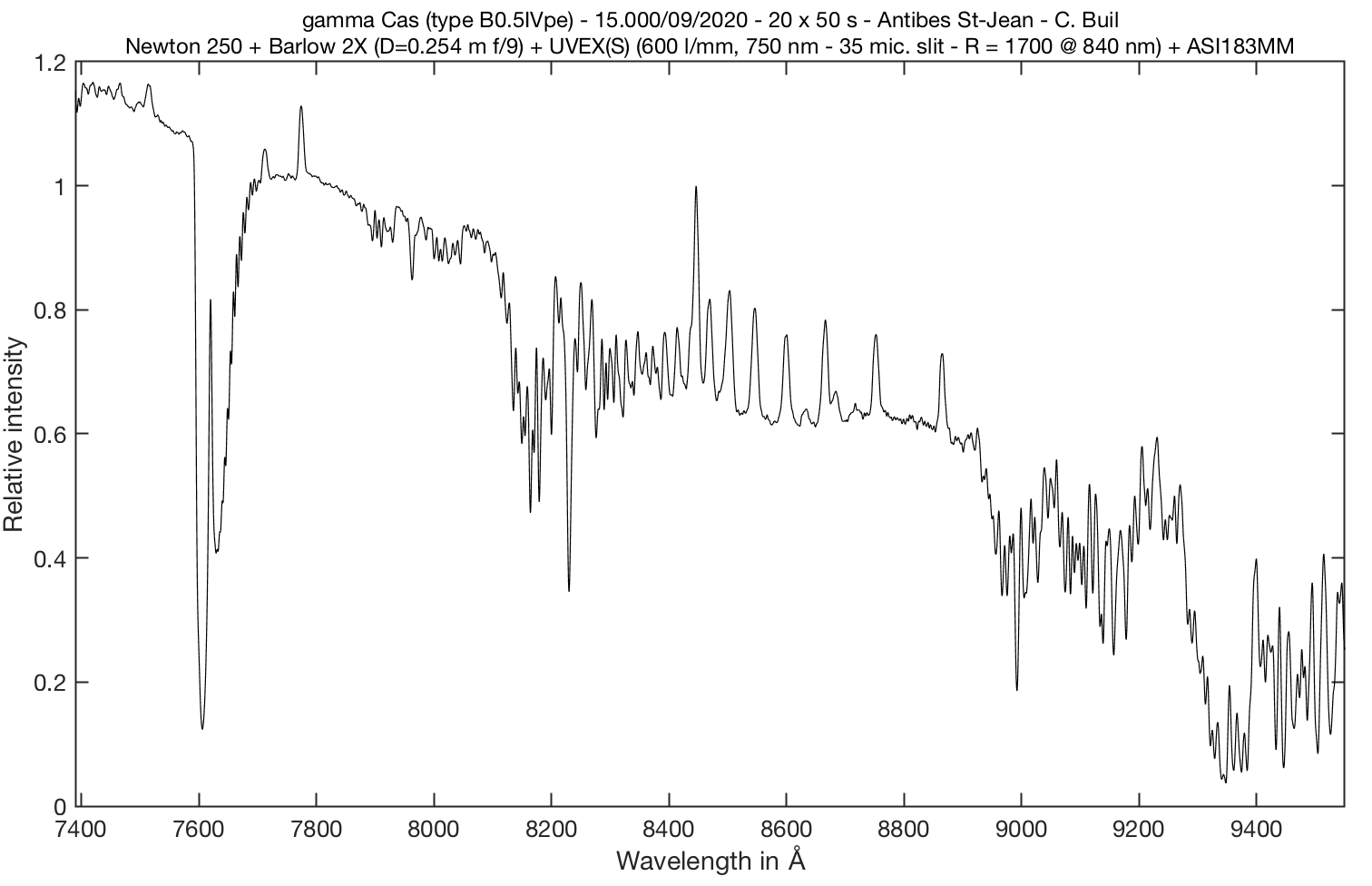
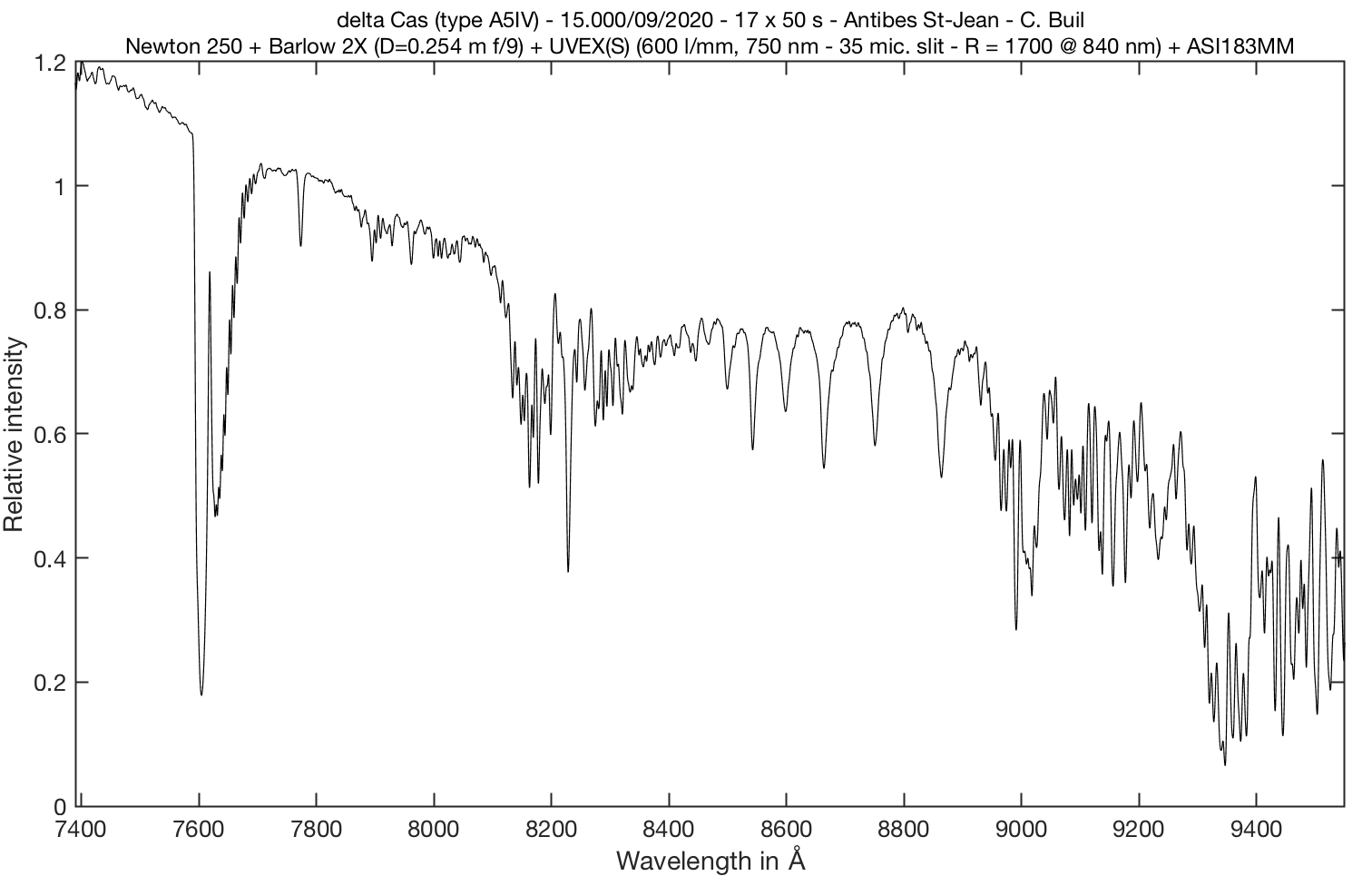
Christian Buil
Re: Nova in Cassiopea (nova Cas 2020)
Posted: Thu Sep 17, 2020 4:14 pm
by Christophe Boussin
Hello all,
Here is my new update for the nova Cas 2020 with the following spectra obtained with my alpy 600 :
the 10th of September at 21 h 22 TU (resolution of 509, JJ = 2459103.3903) and an acquisition time of 80 min :
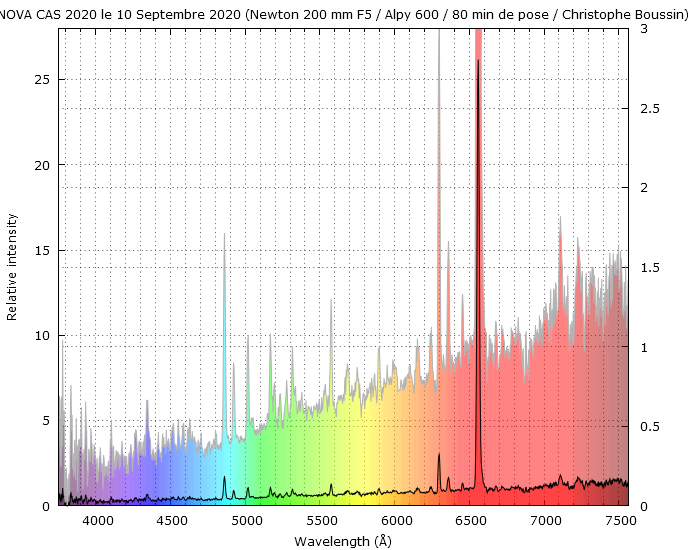
- Nova Cas 2020 on September 10th, 2020
- _novacas2020_20200910_890_Christophe Boussin_3750_7565.png (79.49 KiB) Viewed 5673 times
the 11th of September at 22 h 42 TU (resolution of 506, JJ = 2459104.4459) and an acquisition time of 85 min :
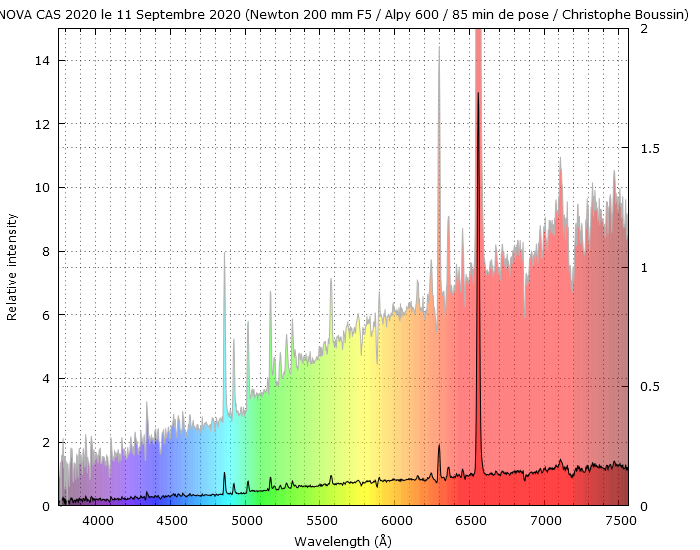
- Nova Cas 2020 on September 11th, 2020
- _novacas2020_20200911_946_Christophe Boussin_3750_7565.png (77.77 KiB) Viewed 5673 times
the 12th of September at 22 h 54 TU (resolution of 505, JJ = 2459105.4542) and an acquisition time of 75 min :
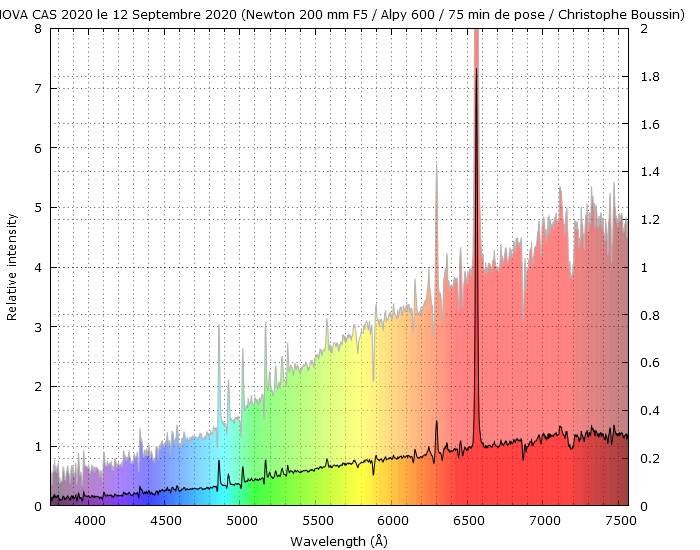
- Nova Cas 2020 on September 12th, 2020
- _novacas2020_20200912_954_Christophe Boussin_3750_7565.png (78.21 KiB) Viewed 5673 times
the 13th of September at 22 h 29 TU (resolution of 505, JJ = 2459106.4372) and an acquisition time of 85 min :

- Nova Cas 2020 on September 13th, 2020
- _novacas2020_20200913_937_Christophe Boussin_3750_7565.png (81.19 KiB) Viewed 5673 times
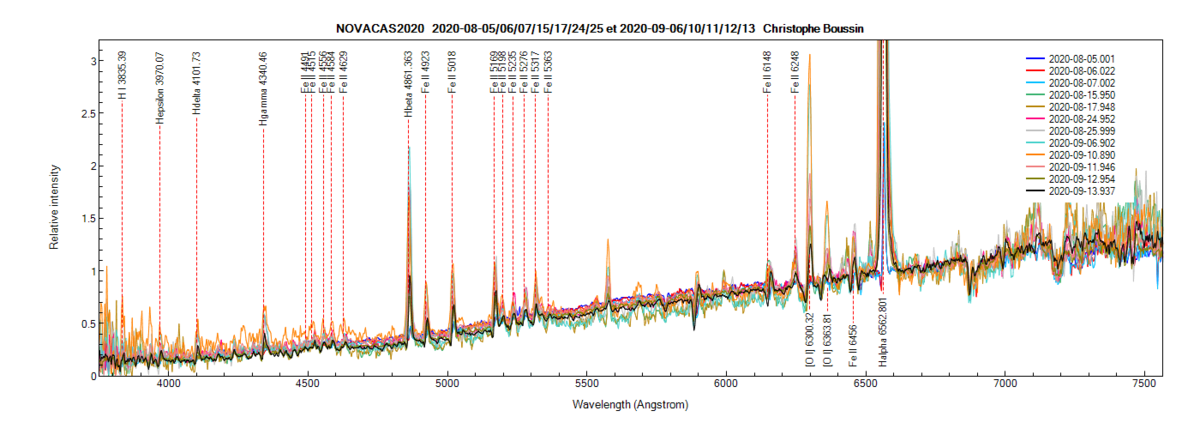
- Nova Cas 2020 on August 5th, 6th, 7th, 15th, 17th, 24th, 25th and on September 6th, 10th, 11th, 12th and 13th 2020 (identification of lines from PlotSpectra)
The relative intensities of the Balmer lines are now decreasing since September 6. Those of [OI] lines at 6300A and 6364A have also been decreasing, since September 10, as well as the FeII lines but still clearly visible.
Evolution of the Halpha line :

- Halpha line on August 5th, 6th, 7th, 15th, 17th, 24th, 25th and on September 6th, 10th, 11th, 12th and 13th 2020
- novacas2020_20200913_937_Christophe Boussin_Halpha.png (42.98 KiB) Viewed 5673 times
Evolution of the [OI] line :
![[OI] line on August 5th, 6th, 7th, 15th, 17th, 24th, 25th and on September 6th, 10th, 11th, 12th and 13th 2020](./download/file.php?id=7158&sid=33f4941dc4c991d4c293629dd9fb5806)
- [OI] line on August 5th, 6th, 7th, 15th, 17th, 24th, 25th and on September 6th, 10th, 11th, 12th and 13th 2020
- novacas2020_20200913_937_Christophe Boussin_OI.png (46.06 KiB) Viewed 5673 times
Clear skies !
Christophe BOUSSIN
Re: Nova in Cassiopea (nova Cas 2020)
Posted: Sat Sep 19, 2020 8:42 pm
by Peter Somogyi
Comparing my result from yesterday to previous (2020.09.12 and 18), in the IR it looks like the N I emissions got stronger - relatively to all other lines:

- novacas2020_20200918_765.png (35.32 KiB) Viewed 5613 times
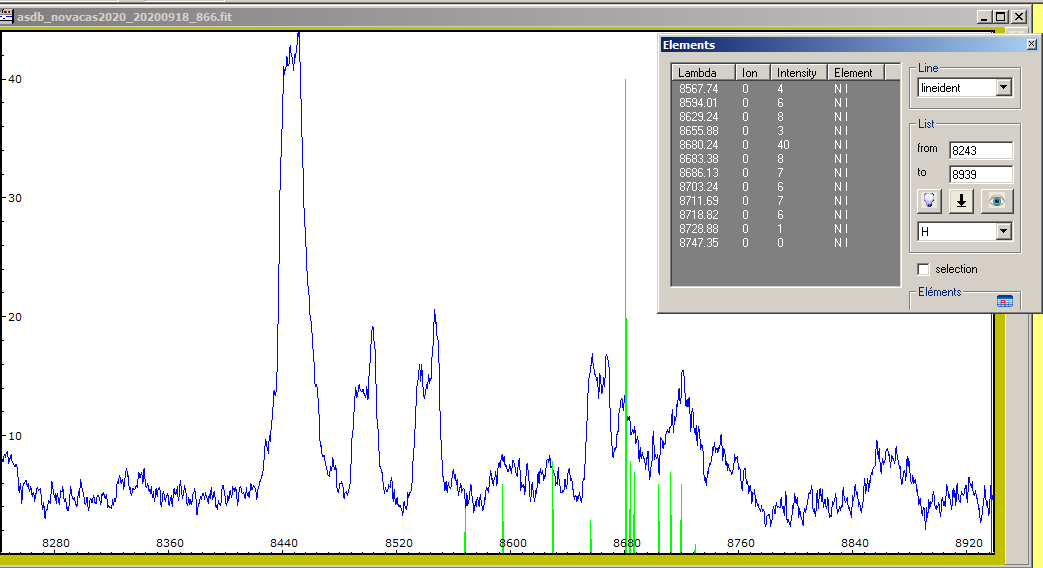
- novacas2020_20200918_866.png (30.62 KiB) Viewed 5613 times
It is causing the rightmost Ca II 8662 blending with the neighbour N I emission.
Peter
Re: Nova in Cassiopea (nova Cas 2020)
Posted: Sun Sep 20, 2020 9:06 am
by Vincent Lecocq
hi all,
i wanted to plot all the spectra of nova cas on the same 3d plot as a time serie.
at a first glance, i obtained that (julian day as x axis, wavelength as y, and relative intensity as z) ...
i'd like to know if there was a need to make any normalization before this operation ? are the spectrum of the database comparable between then as it or is there a need to make an operation before thaht ?
thank you,
vincent
Re: Nova in Cassiopea (nova Cas 2020)
Posted: Sun Sep 20, 2020 9:18 am
by Olivier GARDE
Vincent,
Si tu utilises des spectres en provenance de divers spectro ayant des résolutions différentes, tu n'auras pas la même intensité des raies en emissions : plus la résolution est importante, plus la raie sera profonde.
A mon avis il faudrait que tu "dégrades" les spectres à la résolution du spectre le moins bien résolu pour pouvoir comparer une évolution...
Re: Nova in Cassiopea (nova Cas 2020)
Posted: Sun Sep 20, 2020 9:28 am
by Vincent Lecocq
ok, merci Olivier, je vais essayer !





